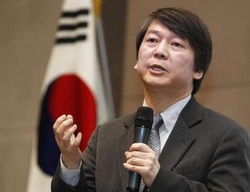Americans will know South Korea’s Democratic Party as the party associated with the “Sunshine Policy” vis-a-vis North Korea. This party has had trouble for nearly years now. Recently, it failed to win a majority in the legislature in April 2012 despite favorable conditions (see post-66), then it failed to win the presidency in December 2012. It is my impression that Koreans tend to view the Democratic Party as a party of corrupt, grandstanding, political-hacks.
The Herald, on June 3rd, reported the following public support, as found in a nationwide survey in mid-May 2013:
21% say they support the Democratic Party (the big center-left party)
40% say they support the Saenuri Party (the big center-right party)
39% say they support neither of those parties
The poll also asked about the prospect of an “Ahn Cheol-Soo Party”.
12% say they would support the Democratic Party if Ahn formed a party [-9%]
29% say they would support the Saenuri Party if Ahn formed a party [-11%]
26% say they would support Ahn Cheol-Soo’s party, if he formed one [+26%]
33% say they would support none of the three parties in that scenario [-6%]
Ahn draws support from left, right, and nonpolitical camps. If the above is accurate, then his party, if formed, would obviously be the new “opposition”. The Democratic Party (with 12% support) would flounder and fold, all else equal.
 Ahn Cheol-Soo
Ahn Cheol-Soo
Potential future president of South Korea
This may cause South-Korean politics to move away from the boringly-binary U.S. model which it has been drifting towards.
